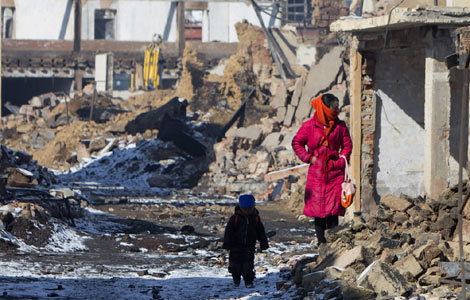The Climate Group head emphasizes environment in reshaping world
Updated: 2014-01-22 13:58
(Xinhua)
|
|||||||||||
BEIJING - China has come to a turning point where it has to rethink its development model from a higher perspective, according to the head of a global green development group.
Wu Chuanghua, Greater China director of The Climate Group, pointed in particular to the contradiction between fast growth and PM 2.5 pollution.
She spoke to Xinhua before leaving for the snowy city of Davos to attend the annual meeting of the World Economic Forum, where elite political and business leaders gather to discuss critical global issues and shape agendas. The main theme for this year is "Reshaping the World: Consequences for Society, Politics and Business."
Wu said, as far as she was concerned, the "reshaping" occurred against the following backdrop: first, the recent rise of emerging economies had posed threats to resources and environment; second, science and technology was developing at an unprecedented pace; third, the middle class in the emerging world would exert more influence on the global market.
Asked if China was now undergoing a drastic reshaping process, she gave an emphatic "yes".
"I think China has been constantly reshaping itself since the reform and opening up policy. China is actively opening its market and working hard to integrate with the rest of the world," she said. "Now China has come to a turning point where the traditional growth pattern must be altered, in order to tackle such urgent problems as heavy smog."
"No growth is worthwhile if it comes at a cost of people's health," she said.
As to whether the government's effort to clean up the air had worked, she said frankly, "Measures have been taken, but it takes time. It is an enduring battle and more needs to be done." She noted the energy mix was still dominated by coal and it would take a longer while to change that fundamentally.
Last year, China rolled out its carbon trading scheme to include seven municipalities and cities. Wu, however, held a conservative view. "No doubt, it is a big step forward, but it cannot fix China's carbon emissions once and for all," she said. "Whether a national-scale platform for carbon trading can be put in place or not depends on the outcome of the pilots."
Wu also outlined her expectations for this year's Davos meeting. She said she is particularly interested in carbon capture and storage, a financing mechanism, forestry and nurture of young talents.
"Youth is our promise, as the climate change issue can by no means be addressed through the effort of one generation," she said.
Related Stories
Beijing goes 'all-out' against air pollution 2014-01-16 17:28
ADB confident in China economy, eyes green development 2014-01-10 11:22
Beijing sees little improvement in air quality in 2013 2014-01-03 01:53
China's transport industry biggest polluter: report 2013-12-16 18:13
US to share lessons with China on pollution reduction 2013-12-03 10:24
Today's Top News
Man, 36, executed for rape, murder of sex slaves
Beijing court accepts GM spat defamation case
Obama, Putin discuss Olympics security in call
Japan seeks US understanding about dolphin hunt
Belarus expects more from Silk Road
Suspected cyberattack on China
China, EU talking investment
Li hails work of foreign experts
Hot Topics
Lunar probe , China growth forecasts, Emission rules get tougher, China seen through 'colored lens', International board,
Editor's Picks

|

|

|

|

|

|





